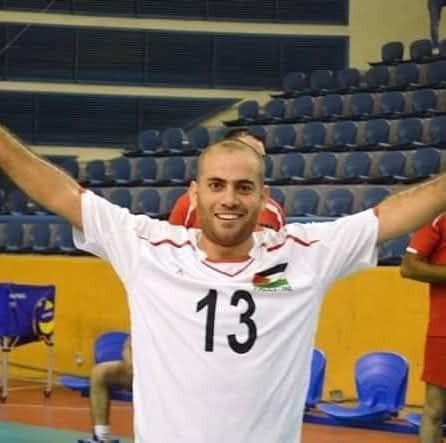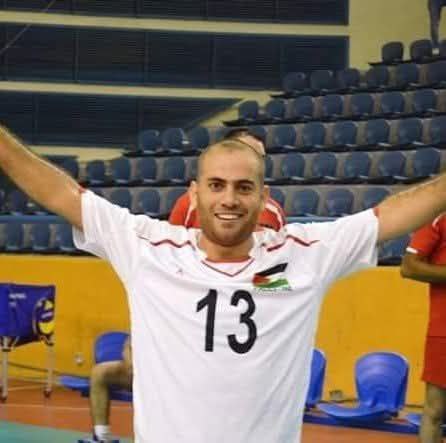BREAKING: Israeli Airstrike Kills Palestinian Volleyball Leader
Captain Ahmad Al-Mufti: A Tragic Loss for Palestine’s Volleyball Community
On June 19, 2025, the world was shaken by the tragic news of the death of Captain Ahmad Al-Mufti, the esteemed leader of Palestine’s national volleyball team and a prominent figure in the Jabalia Youth Club. Al-Mufti was killed in an Israeli airstrike on Gaza, marking a devastating loss for the sports community and the nation as a whole. This incident underscores the ongoing conflict in the region and its impact on innocent lives, including those dedicated to sports and community development.
The Legacy of Captain Ahmad Al-Mufti
Captain Ahmad Al-Mufti was not just a volleyball player; he was a symbol of hope and resilience for many Palestinians. His leadership on the national team inspired young athletes across Gaza, fostering a sense of unity and pride in their capabilities. Al-Mufti’s commitment to volleyball went beyond the court; he was an advocate for peace and understanding through sports, believing in its power to bring people together in times of strife.
His involvement with Jabalia Youth Club highlighted his dedication to nurturing young talent. Under his guidance, many aspiring athletes found their passion for volleyball, learning the values of teamwork, discipline, and perseverance. Al-Mufti’s legacy will undoubtedly live on through the countless players he mentored and the spirit of sportsmanship he instilled in them.
- YOU MAY ALSO LIKE TO WATCH THIS TRENDING STORY ON YOUTUBE. Waverly Hills Hospital's Horror Story: The Most Haunted Room 502
The Impact of the Airstrike
The airstrike that claimed Captain Al-Mufti’s life is part of a broader pattern of violence that has plagued Gaza for years. The ongoing conflict has led to significant casualties among civilians, including athletes, artists, and educators who contribute to the cultural and social fabric of Palestinian society. Each loss is a stark reminder of the human cost of war and the fragility of life in conflict zones.
Al-Mufti’s death sent shockwaves through the volleyball community and beyond. Tributes poured in from fellow athletes, coaches, and organizations, all expressing their sorrow and solidarity with his family and the Palestinian people. His passing is felt not only as a loss of a talented player but also as a loss of a leader who embodied the dreams and aspirations of his nation.
The Role of Sports in Conflict Zones
In conflict areas like Gaza, sports often serve as a beacon of hope and a means of resilience. Athletes like Al-Mufti play crucial roles in their communities, providing a sense of normalcy amidst chaos. Sports have the power to transcend boundaries and foster connections among people, regardless of their circumstances.
However, the harsh realities of war often impede these efforts. Facilities are damaged, resources are scarce, and the safety of athletes is constantly at risk. Despite these challenges, the passion for sports endures, with many individuals striving to keep the spirit of competition alive. The loss of figures like Captain Ahmad Al-Mufti serves as a painful reminder of the obstacles faced by athletes in conflict zones, highlighting the urgent need for peace and stability.
A Call for Peace and Understanding
Captain Al-Mufti’s untimely death is a call to action for advocates of peace worldwide. It emphasizes the need for dialogue and understanding among conflicting parties. Sports can be a powerful tool for promoting peace, fostering cooperation, and bridging divides. As the global community mourns the loss of this talented athlete, it is essential to remember the broader implications of such tragedies and work towards a future where sports can flourish without the shadow of violence.
Organizations and individuals dedicated to peace-building initiatives can draw inspiration from Al-Mufti’s legacy. By supporting athletes and communities in conflict zones, we can help create environments where sports thrive, and young people can pursue their passions without fear.
Conclusion
The tragic death of Captain Ahmad Al-Mufti serves as a poignant reminder of the human cost of conflict and the vital role that sports play in our lives. His legacy will continue to inspire athletes in Palestine and beyond, encouraging them to pursue their dreams and advocate for peace. As we reflect on this loss, let us honor Captain Al-Mufti by committing to a world where sports unite rather than divide, where every athlete can compete in safety, and where the spirit of competition is celebrated free from the turmoil of war.
In this time of mourning, we extend our condolences to Captain Al-Mufti’s family, friends, and the entire Palestinian community. May his memory live on, inspiring future generations to strive for excellence both on and off the court.

BREAKING: Captain Ahmad Al-Mufti, leader of Palestine’s national volleyball team and Jabalia Youth Club, was killed in an Israeli airstrike on Gaza. pic.twitter.com/XqE9yfnJGu
— Quds News Network (@QudsNen) June 19, 2025
BREAKING: Captain Ahmad Al-Mufti, leader of Palestine’s national volleyball team and Jabalia Youth Club, was killed in an Israeli airstrike on Gaza.
In a devastating turn of events, Captain Ahmad Al-Mufti, who was not only the captain of Palestine’s national volleyball team but also a significant figure in the Jabalia Youth Club, lost his life in an Israeli airstrike on Gaza. This tragic news has sent shockwaves through the sports community in Palestine and beyond, highlighting the ongoing conflict and its impact on innocent lives.
Who Was Ahmad Al-Mufti?
Ahmad Al-Mufti was more than just a volleyball player; he was a symbol of hope and resilience for many in Palestine. As the captain of the national volleyball team, he led by example, inspiring young athletes to pursue their dreams despite the challenges they faced. His leadership role at the Jabalia Youth Club was crucial in nurturing talent and providing a safe space for young people to engage in sports, away from the harsh realities of their environment.
Al-Mufti’s commitment to volleyball and his community was evident in how he dedicated his life to the sport. Many remember him not only for his skills on the court but also for his ability to unite people through the love of the game. His vision extended beyond just winning matches; he aimed to uplift his community and promote peace through sportsmanship.
The Impact of Conflict on Sports
The conflict in Gaza has long affected various aspects of life, including sports. Athletes like Al-Mufti have found it increasingly difficult to train, compete, and represent their nation on international stages. Resources are limited, and safety is always a concern. The loss of a figure like Ahmad Al-Mufti underscores the broader implications of violence on innocent lives and the future of sports in the region.
Sports have the power to bring people together, but in conflict zones, that power is often stifled by fear and uncertainty. The tragic news of Al-Mufti’s death serves as a stark reminder of the human cost of war, where dreams and aspirations are often cut short. Athletes are not just competitors; they are role models and leaders, and the loss of one can resonate deeply within the community.
Reactions from the Sports Community
In the wake of this heartbreaking news, the response from the sports community has been overwhelming. Fellow athletes, coaches, and sports fans have taken to social media to express their sorrow and pay tribute to Al-Mufti’s legacy. Many shared personal stories about how he inspired them and contributed to their lives, both on and off the court.
Sports organizations and federations have also released statements, emphasizing the importance of peace and the need to protect athletes and civilians alike. The international sports community has rallied in support of Palestine, calling for an end to the violence that claims innocent lives and disrupts the spirit of sportsmanship.
What Lies Ahead for Palestinian Sports?
The future of Palestinian sports hangs in the balance. With leaders like Al-Mufti gone, there is a pressing need for new voices to emerge and continue the fight for peace through sports. The infrastructure for sports in Gaza and the West Bank has been severely affected by years of conflict, and rebuilding it will require not only resources but also a commitment to fostering a culture of peace and cooperation.
For young athletes in Palestine, the dream of competing on an international level seems even more distant now. However, if Ahmad Al-Mufti’s legacy teaches us anything, it’s about the importance of resilience and hope. Those passionate about sports must come together to ensure that his vision lives on, creating opportunities for the next generation of athletes.
The Role of International Support
International support plays a crucial role in helping Palestinian sports recover and thrive. Organizations that focus on sports development can provide much-needed resources and training opportunities. Furthermore, awareness campaigns can help shed light on the challenges faced by athletes in conflict zones, fostering empathy and understanding among global audiences.
As we remember Captain Ahmad Al-Mufti, it’s essential to advocate for peace and safety for all athletes, regardless of where they come from. The sports community has a unique platform to promote dialogue and understanding, and it must be utilized to its fullest potential.
Conclusion: Honoring Ahmad Al-Mufti’s Legacy
In honoring the memory of Ahmad Al-Mufti, we must reflect on the impact he had on his community and the sport of volleyball. His untimely death is a painful reminder of the fragility of life in conflict zones, but it also serves as a call to action for those who remain. The spirit of sportsmanship and the pursuit of dreams should never be extinguished, even in the darkest of times.
As we move forward, let us carry the torch that Al-Mufti lit, striving to create a better environment for all athletes in Palestine and beyond. Through solidarity and support, we can help ensure that future generations have the opportunity to play, dream, and inspire, just as Ahmad Al-Mufti did.

